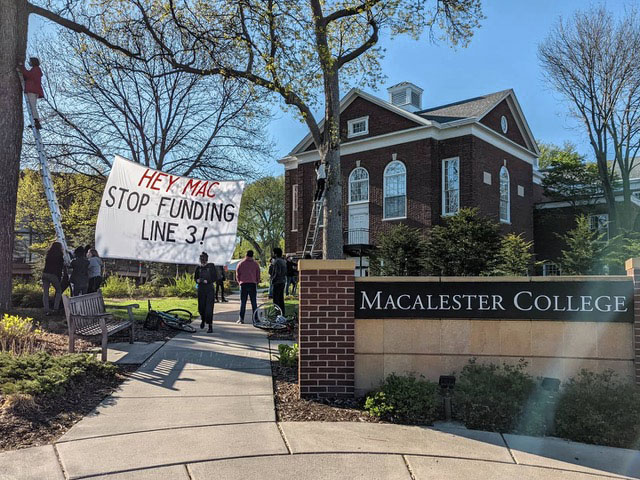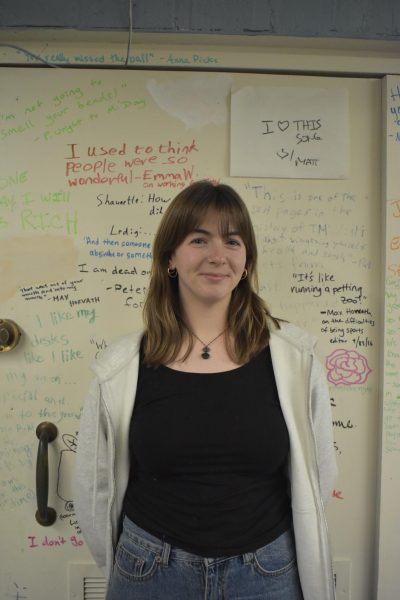Finding spaces for environmental activism at Macalester
December 1, 2022
College years are the time of one’s life to inspire change. Many choose to stand up for what is right, and work towards becoming a member of society who thinks critically about their place and their surroundings. For a liberal arts school in a major metropolitan area, this change is incredibly prevalent in student and campus life.
Macalester has a reputation among peer institutions for being at the forefront of various movements and protests; students are typically involved in and spearheading change within the college and community beyond.
“Macalester has a huge and varied history of activism,” Louise Bequeaith ’23 said. “Historically, we don’t talk about activism as much at Macalester as we should [especially] thinking about the reason why we have a lot of the resources we have now [which are] a product of student activism and students holding our establishments accountable.”
For American Studies professor and Macalester alum Kiri Sailiata, those efforts have not gone unnoticed and play a large role in the shape of the college today.
“Youth activism, and in particular, student activism has served as a catalyst for major social and political transformations,” Sailiata said in an email to The Mac Weekly. “Student organizing has been central to the formation of departments and community-engaged and social justice driven emphases such as ethnic studies, Black studies, Native American and Indigenous studies, disability studies, women and gender studies [and] environmental studies/environmental justice.”
On campus today, while many students are passionate about change, getting involved in activism takes a certain level of independence. You have to look for conversations to find them.
“I think a lot of it can be pretty self-driven, if people have a cause, or if they have something that they’re really passionate about, they’re going to go out and find those activist spaces to do that,” Evelyn Kent ’25 said. “And if they’re not, they’re not going to participate in activism.”
For many students at Macalester, activism wasn’t something prominent in their college search, but something they found within the campus environment. Such is the case with Sabri Fair, a 2021 graduate who found a home in a campus activist group. From 2013 to 2021, Macalester students ran a student organization called “Fossil Free Mac,” which worked to raise awareness and hold the institution accountable for its direct investment in private fossil fuel partnerships, particularly with Enbridge Energy.
“I first got involved [in Fossil Free Mac] through the involvement fair, that was a common way for people to get involved but word of mouth was incredibly important, especially in 2020/21 because of COVID-19,” Fair said in an email to The Mac Weekly. “Despite COVID-19, in 2021 we built a broader coalition with new people and groups that were drawn to our work because it was directly fighting against Enbridge and their Line 3 project, which had started to get a lot more visibility in the Twin Cities.”
Through research, discussion and on-the-ground organizing such as collecting signatures, Fossil Free Mac ran for eight years, experiencing multiple student turnovers. In 2021, Fossil Free Mac succeeded when Macalester’s divested from Enbridge Energy.
“The goal [of Fossil Free Mac] was to make sure our tuition money and our institution’s endowment didn’t impact marginalized communities that bear the brunt of climate change and extractive industries,” Fair said. “By my senior year it became explicitly clear how this was [environmental justice] work as we saw how Indigenous communities in Minnesota were threatened by man camps, their wild rice lakes were drained and their waterways were threatened by oil spills which Enbridge is notorious for.”
While Fossil Free Mac and many of the student activists associated with it have since left Macalester, the systemic and institutionalized injustices that Fossil Free Mac fought for still exist on and around campus.
“Students have more of an understanding of ways in which the systems fail them [and] I think COVID has brought those things to the light,” Bequeaith said. “The weight of the world right now is heavier for people and COVID was a big part of that, students aren’t able to just focus on their classes and what’s happening in the institution because there are so many things going on in our lives [and] we have to be spread across all of those different areas. That’s changed the energy level of people, the ability for people to put energy into spaces.”
In Sailiata’s Introduction to Environmental Justice course, she is working to provide that space for activism for her students by advising the creation of a toolkit for environmental justice activism at Macalester and in the community.
“Toolkits are a common resource to help initiate and sustain community organizing,” Sailiata said. “They inform readers and participants about a topic through reports or case studies about issues of social and environmental injustice. They also prompt action and deeper engagement through activities, worksheets, further readings, and other educational resources. I think that is what makes it such a great fit to launch an initial version for Introduction to Environmental Justice.”
Kent and Bequeaith are both students in this course and have been involved in activism at Macalester outside of a classroom setting. Still, they appreciate the activist environment Sailiata has cultivated.
“[It’s] good to have spaces within our classes that allow us to dig into the history of the institution, [and] I think it’s important that we are granted that time and pushed to have that energy to be critical of Macalester,” Bequeaith said. “[In thinking] about what resources we do have that we could transform it’s nice to have that space within a classroom [and] support in retelling these histories and making these connections.”
The class is hoping to inspire the broader Macalester community to be in discussions about the institution’s history. For the seniors in the class, there’s a sense of pride in themselves for their work inside and outside the class as well as pressure to keep the activism legacy of Macalester alive.
“For the past four years, I’ve seen students work really hard to make changes at Macalester and I’ve seen establishments not really react to those things,” Bequeaith said. “I see students burn out a lot because their activism is not being supported, nor are they actually being listened to. Nonetheless, students continue to fight over and organize around those things and come together.”
Featuring nine case studies by Introduction to Environmental Justice students, the toolkit explores environmental justice as it relates to Macalester, positionality in Minnesota, and getting involved in environmental justice work and organizing. The toolkit will be available online.
*Evelyn Kent is a staff writer for The Mac Weekly.













